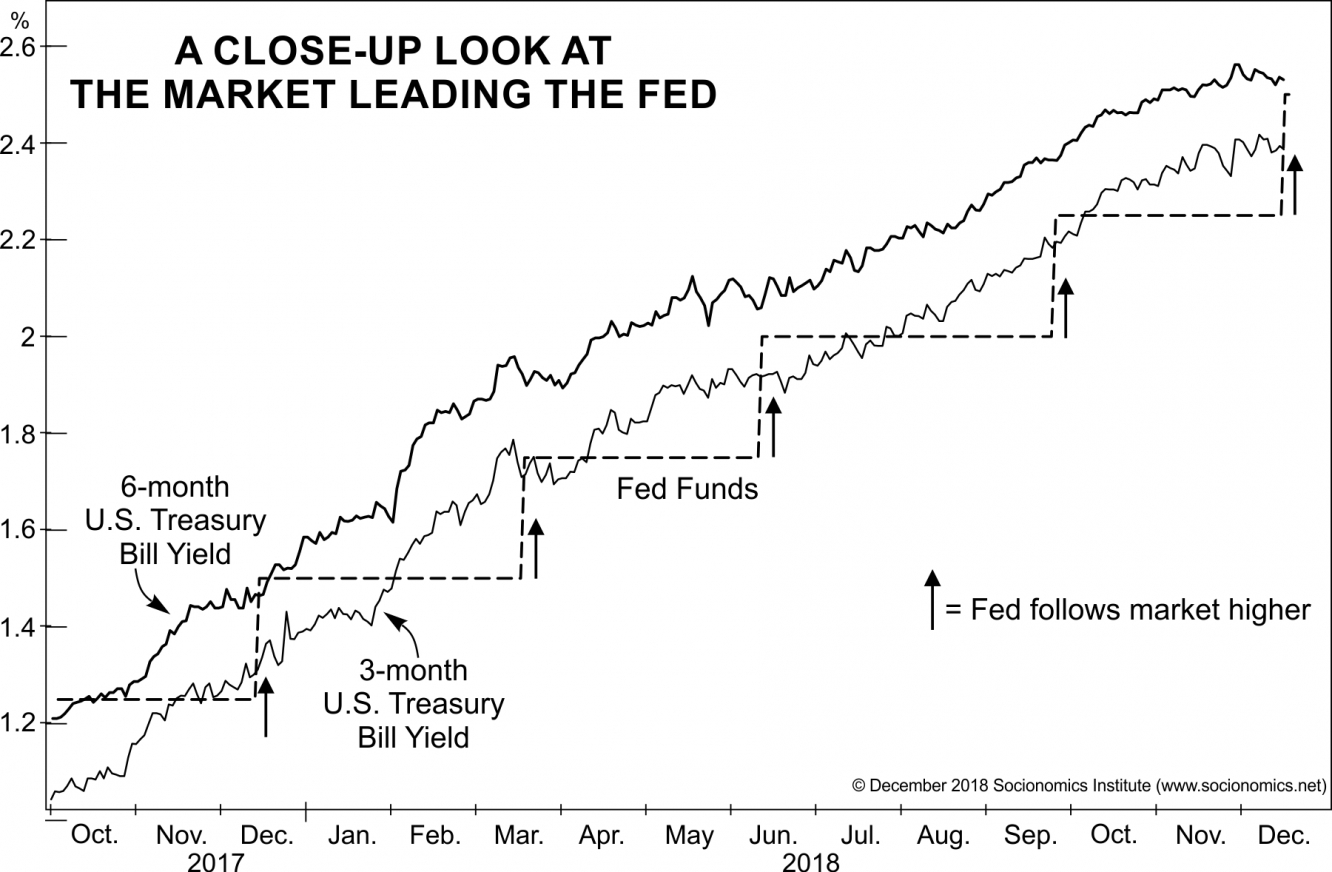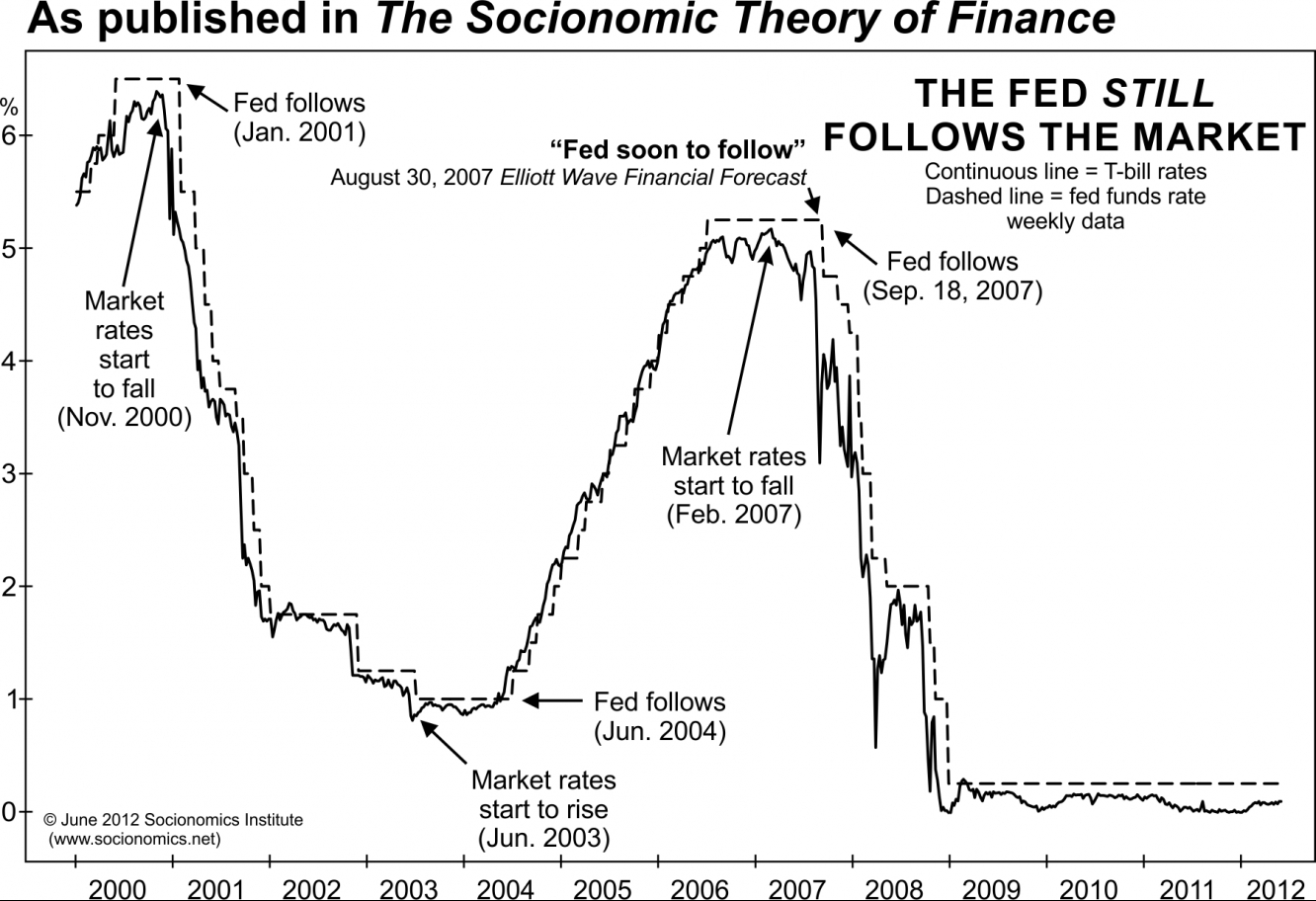Want to Know the Fed’s Next Move? Pay Attention to This Signal
Elliott Wave International | Jan 14, 2019 02:18PM ET
By Peter Kendall & Steven Hochberg
Most economists and financial analysts believe that central banks set interest rates. For more than two decades, Elliott Wave International has tracked the relationship between interest rates set by the marketplace and interest rates set by the U.S. Federal Reserve and found that it’s actually the other way around—the market leads, and the Fed follows.
The latest Federal Reserve rate decision on December 19 brought the usual breathless anticipation. Confusion reigned as the U.S. president as well as a former Fed board member publicly urged the U.S. central bank not to raise rates and many wondered if the Fed would “rescue” investors with a surprise decision to leave them unchanged. The Fed, however, did what it almost always does: it brought its rate in line with market rates.
The Fed increased its federal funds rate a quarter-point from 2.25% to 2.50%. As shown by the dashed line in Figure 1, the Fed’s move followed a rise in the six-month U.S. Treasury bill yield from 2.36% to 2.56% and an increase in the three-month U.S. Treasury bill yield from 2.18% to 2.42% since the prior Fed rate hike on September 26. So, market rates remain nearly undefeated when it comes to predicting what the Fed’s actions will be.

Figure 1
Figure 2, a longer term version of the same relationship, is from The Socionomic Theory of Finance by Robert Prechter. It shows the federal funds rate as set by the Fed and the market-set three-month U.S. Treasury bill yield back to early 2000. This history shows that the T-bill market moves first and the Fed’s interest-rate changes follow. As a result, no one monitoring the Fed’s decisions can predict when T-bill rates will change, but anyone monitoring the T-bill rate can predict when the Fed’s rates will change. We demonstrated this ability in August 2007 by predicting that the Fed was on the cusp of lowering its federal funds rate dramatically. Figure 2 shows the timing and its aftermath.

Figure 2
Over the years, Fed leaders have indicated that they’re in the dark. On September 17, 2007, a CNBC interviewer asked former chairman Alan Greenspan, “Did you keep interest rates too low for too long in 2002-2003?” Greenspan instantly responded, “The market did.” In a November speech this year, current chairman Jerome H. Powell likened the Fed’s situation to walking through a living room when the lights suddenly go out. He said, “What do you do? You slow down and you maybe go a little bit less quickly, and you feel your way more. So under uncertainty of this kind, you be careful.” The Fed has recently racked up $66.5 billion in paper losses in its bond portfolio, far exceeding its $39.1 billion in capital. Would you trust an institution that lost so much money in the bond market that it sank to a net worth of negative $27.4 billion to tell you where interest rates were headed? The Fed continually follows the market because it lacks any other useful guide.
The same principle holds in Europe, the U.K. and Australia. See chapter 3 of The Socionomic Theory of Finance for the full story of markets’ global dominance of “interest rate policy.”
About Peter Kendall
Peter Kendall co-edits Elliott Wave International’s Elliott Wave Financial Forecast with Steven Hochberg. He also provides commentary on cultural trends, the economy and the U.S. stock market for the firm’s Global Market Perspective. Kendall began his career as a financial reporter and columnist in 1983. He wrote “On the Money,” a column for The Business Journal, from 1991 to 1997. Kendall joined Elliott Wave International as a researcher in 1992 and served as the director of EWI’s Center for Cultural Studies, where he focused on popular culture and the new science of socionomics. He has been contributing to Global Market Perspective since 1995, and he also contributes to EWI’s Short Term Update. He graduated from Miami University in Oxford, Ohio, with a degree in Business Administration.
About Steven Hochberg
Steven Hochberg co-edits Elliott Wave International's Elliott Wave Financial Forecast with Peter Kendall, writes the Short Term Update thrice weekly, and provides commentary on the U.S. stock market, interest rates and precious metals for Global Market Perspective. Over the years, Hochberg has become a sought-after lecturer and has been quoted in various media outlets, such as USA Today, The Los Angeles Times, The Washington Post, Barron’s, Reuters and Bloomberg. He has also discussed financial markets on CNBC, MSNBC and Bloomberg Television. Hochberg began his professional career with Merrill Lynch and joined Elliott Wave International in 1994.
Trading in financial instruments and/or cryptocurrencies involves high risks including the risk of losing some, or all, of your investment amount, and may not be suitable for all investors. Prices of cryptocurrencies are extremely volatile and may be affected by external factors such as financial, regulatory or political events. Trading on margin increases the financial risks.
Before deciding to trade in financial instrument or cryptocurrencies you should be fully informed of the risks and costs associated with trading the financial markets, carefully consider your investment objectives, level of experience, and risk appetite, and seek professional advice where needed.
Fusion Media would like to remind you that the data contained in this website is not necessarily real-time nor accurate. The data and prices on the website are not necessarily provided by any market or exchange, but may be provided by market makers, and so prices may not be accurate and may differ from the actual price at any given market, meaning prices are indicative and not appropriate for trading purposes. Fusion Media and any provider of the data contained in this website will not accept liability for any loss or damage as a result of your trading, or your reliance on the information contained within this website.
It is prohibited to use, store, reproduce, display, modify, transmit or distribute the data contained in this website without the explicit prior written permission of Fusion Media and/or the data provider. All intellectual property rights are reserved by the providers and/or the exchange providing the data contained in this website.
Fusion Media may be compensated by the advertisers that appear on the website, based on your interaction with the advertisements or advertisers.